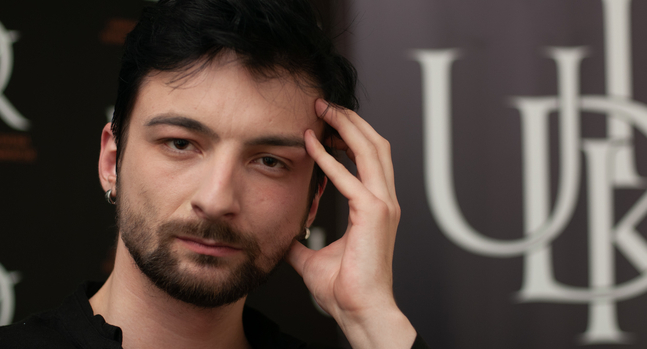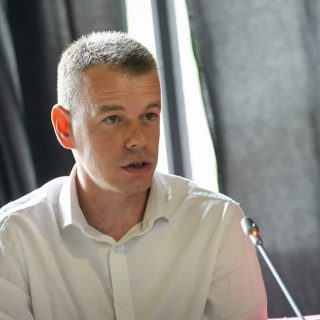Author: Edvin Kanka Ćudić
All difficulties faced by the post-war Bosnian and Herzegovinian society result from its failure to face the past. The deeply divided community in political and administrative terms is an advantage for officials using politics, media, but also education to make the process of facing war crimes more complicated, given the fact that they see the process as a threat for their ethno-political system of power division.
An unequal approach to victims of war crimes committed in the 1990s results in an unequal approach to all injured parties. This also results, among other things, in returnees facing discrimination, abuse and insecurity in their communities, but also in non-recognition of the suffering of war survivors and failure to mark the places in which crimes were committed.
In 2019, the Initiative for RECOM (Initiative for the establishment of a Regional Commission tasked with establishing the facts about all victims of war crimes and other serious human rights violations committed on the territory of the former Socialist Federal Republic of Yugoslavia in the period from January 1, 1991 to December 31, 2001) was restructured in Zagreb. The reason for this were the current political circumstances and ”the lack of support in Croatia for the Initiative for RECOM”. The Coalition for RECOM stated that the establishment of an inter-governmental committee and reconciliation were ”no longer priorities for the policies pursued by the Bosniak and Croatian member of the Presidency of Bosnia and Herzegovina”. Republika Srpska does not take into account judgments of the International Criminal Tribunal for the Former Yugoslavia as a pre-requisite for establishing facts, and ”Slovenia believes that there were no war victims in that country and that there are no grounds for it to participate in the list of victims of war”. The RECOM Reconciliation Network therefore assumed the obligation of performing the task of successor states of Tito’s Yugoslavia, namely the drafting of a list of victims of Yugoslavian wars.[1]
The United Nations General Assembly proclaimed June 19 the Day for the Elimination of Sexual Violence in Conflict. It wished to bring attention to this issue and honour both victims and those fighting for the elimination of such crimes. There are no commemorative plaques to bear witness of the fact that numerous buildings were used for illegal detention of civilians in cities that are symbols of rape cases committed in Bosnia and Herzegovina, such as the sports hall Partizan in Foča or the hotel Vilina vlas in the city of youth of the Nobel prize winner, Ivo Andrić.[2]
Višegrad spa at the hotel Vilina vlas was used for torturing and killing men. It was also used for gang rapes of women.[3] Although it is well known what members of the Army of Republika Srpska did at Vilina vlas, everything becomes even more terrible when a foreign tourist goes to the mentioned spa without knowing that the very same premises were used for month-long torture of women. The Australian Kym Vercoe felt deceived.[4]
The commemoration of civilian victims of war is not a priority of local authorities. This is also demonstrated by the fact that families of Hajrudin Muzurović and Husein Kršo, who were shot by Goran Jelisić at the entrance of the Community House in Brčko on May 7, 1992, while being filmed by Bojan Stojanović, were able to commemorate the anniversary of this crime for the first time and put flowers in the place of their murder only in 2024. Although this had been an obligation of the authorities of Brčko, the initiative was launched by NGOs. Udruženje za društvena istraživanja i komunikacije (UDIK), an association for social research and communication, sent the initiative to put up a commemorative plaque in this place to institutions of Brčko District twice, but they failed to respond.[5]
While no monument dedicated to children killed during the war was erected in Prijedor, the text of the monument in Kazani near Sarajevo does not provide the context in which crimes were committed in that location. In 2022, an initiative was launched to put a commemorative plaque at the cemetery Sveti Josip in Centar municipality, in the location of re-exhumation of persons killed in Kazani, Gaj and Grm Maline. This initiative was supported by 16 councillors during a meeting of the Sarajevo City Assembly in 2023.[6] However, it was annulled in a public discussion. The following year, it was supported by 13 councillors out of the necessary minimum of 16 councillors.[7]
The Humanitarian Law Centre organised a regional conference entitled ”Prosecuting War Crimes in the Countries of the Former Yugoslavia – A Twenty-Year Review” in Belgrade in November 2024. The best experts on transitional justice from the region participated in discussions and pointed out that it was more necessary than ever before to speak about crimes. Nenad Golčevski, the Executive Director of the Centre, stated that he was told by representatives of international organisations that such an event should be organised every year. However, there were unfortunately no such events over the past decade.
The decision of the High Representative for Bosnia and Herzegovina, Valentin Inzko, to impose amendments to the Criminal Code of Bosnia and Herzegovina is of great importance. According to these amendments, whoever publicly condones, denies, grossly trivialises or tries to justify a war crime, a crime against humanity and genocide, shall be punished by imprisonment. This constitutes progress in facing the past.[8] Also, persons convicted of war crimes may no longer stand for elections or hold public functions.[9]
Progress was achieved, but due to the assistance of the international community. This is also shown by a Resolution of the United Nations General Assembly adopted in 2024.
According to the Resolution, denial of crimes and glorification of war criminals who perpetrated the genocide in Srebrenica is an anti-civilisational act. Member states of the largest global organisation were given the recommendation to mark the anniversary.[10] In addition to this, there is also the establishment of a register of war criminals in Bosnia and Herzegovina, i.e. the entry of the names of perpetrators in domestic criminal records.[11] It is stated that an obstacle for facing the past is the fact that the law makes it possible for convicted war criminals that were sentenced to prison sentences of less than a year to pay fines in order to avoid imprisonment.[12]
Children born as a result of war rape were granted the status of civilian victims of war in Brčko District of Bosnia and Herzegovina[13] and the Federation of Bosnia and Herzegovina.[14] Brčko was the first jurisdiction in Bosnia and Herzegovina and Europe to grant the status of victims to these persons.[15] However, it will take more time in order for this practice to become more than just words on paper in the so-called third entity of the home country of Meša Selimović.
Events that the society has to face in the process of facing the crimes are not something that scores political points. The path is long and winding, with lots of taboo topics. There are many other examples that one could mention, both good and bad ones, but that is not the point. The faster we approach facing the past and building of a democratic society, the better it will be for future generations and the lighter the burden they will have to bear. The easier it will be to encourage them through our acts. We need to face difficult issues and go forward instead of sweeping them under the carpet. And the reason for this is to spare the new generations from hesitating to face them, the way this is happening in case of our contemporaries.
Edvin Kanka Ćudić is a Bosnian human rights activist. He is best known as the leader of the Association for Social Research and Communication (UDIK), an organization that advocates for human rights and reconciliation in the former Yugoslavia.
[1] Association Network for Building Peace. 2019. ”Koalicija za REKOM preuzima brigu za izradu regionalnog popisa žrtava u vezi s ratovima devedesetih na području bivše Jugoslavije”. Network for Building Peace. https://www.mreza-mira.net/vijesti/razno/koalicija-za-rekom-preuzima-brigu-za-izradu-regionalnog-popisa-zrtava/ (accessed on December 8, 2024)
[2] Bešić, Adnan. 2024. ”U Foči obilježen Međunarodni dan borbe protiv seksualnog nasilja nad ženama u ratu”. Anadolija. https://www.aa.com.tr/ba/balkan/u-fo%C4%8Di-obilje%C5%BEen-me%C4%91unarodni-dan-borbe-protiv-seksualnog-nasilja-nad-%C5%BEenama-u-ratu/3253491 (accessed on December 8, 2024)
[3] I. Č. 2020. ”Pokrenuta peticija da se višegradski hotel strave ukloni s Googlea”. Klix. https://www.klix.ba/vijesti/bih/pokrenuta-peticija-da-se-visegradski-hotel-strave-ukloni-s-googlea/200703023 (accessed on December 8, 2024)
[4] Radio Sarajevo. 2018. ”Priča o hotelu Vilina vlas: Višegrad u borbi da zataška ratne zločine”. Radio Sarajevo. https://radiosarajevo.ba/vijesti/bosna-i-hercegovina/visegrad-se-uporno-bori-da-maksimalno-negira-ratne-zlocine-i-silovanja/292509#google_vignette (accessed on December 8, 2024)
[5] Begić, Jasmin. 2024. ”Vlasti u Brčko distriktu ignorišu inicijativu za spomenik ubijenim civilima”. Detektor. https://detektor.ba/2024/05/06/vlasti-u-brcko-distriktu-ignorisu-incijativu-za-spomenik-ubijenim-civilima/ (accessed on December 8, 2024)
[6] S. M. 2023. ”Cacine žrtve zaslužuju spomenik u Sarajevu”. O kanal. https://okanal.oslobodjenje.ba/okanal/vijesti/cacine-zrtve-zasluzuju-spomenik-u-sarajevu-902069 (accessed on December 8, 2024)
[7] Jerković, Matea. 2024. ”Sarajevo se ne suočava sa prošlošću: Ništa od spomen-obilježja na groblju Sveti Josip”. Oslobođenje. https://www.oslobodjenje.ba/vijesti/bih/sarajevo-se-ne-suocava-sa-prosloscu-nista-od-spomen-obiljezja-na-groblju-sveti-josip-989492 (accessed on December 8, 2024)
[8] OHR. 2021. ”Visoki predstavnik Valentin Inzko uveo je danas dopunu Kaznenoga zakona BiH”. OHR. https://www.ohr.int/visoki-predstavnik-valentin-inzko-uveo-je-danas-dopunu-kaznenoga-zakona-bih/ (accessed on December 6, 2024)
[9] OHR. 2024. ”Odluka kojom se donosi Zakon o izmjenama i dopunama Izbornog zakona Bosne i Hercegovine”. OHR. https://www.ohr.int/decision-enacting-the-law-on-amendments-to-the-election-law-of-bosnia-and-herzegovina-17/ (accessed on December 10, 2024)
[10] N1 BiH. 2024. ”Generalna skupština UN-a usvojila Rezoluciju o genocidu u Srebrenici”. N1 info. https://n1info.ba/vijesti/generalna-skupstina-un-a-usvojila-rezoluciju-o-genocidu-u-srebrenici/ (accessed on December 9, 2024)
[11] Zvijerac, Predrag. 2024. ”Momčilo Krajišnik i formalno ratni zločinac u BiH, ali Ratko Mladić nije”. Radio Slobodna Evropa https://www.slobodnaevropa.org/a/karadzic-mladic-krajisnik-ratni-zlocini-bih-krivicna-evidencija/33197642.html (accessed on December 6, 2024)
[12] Aljović, Armin. 2023. ”Osuđeni za ratne zločine u BiH otkupljuju kazne i izlaze na slobodu”. Al Jazeera Balkans. https://balkans.aljazeera.net/teme/2023/2/12/akivisti-traze-da-bih-ukine-mogucnost-otkupa-kazne-zatvora-u-slucaju-ratnih-zlocina (accessed on December 10, 2024)
[13] Kešmer, Meliha. 2022. ”Djeca rođena nakon silovanja priznata u Brčkom, ali ne i ostatku BiH”. Radio Slobodna Evropa. https://www.slobodnaevropa.org/a/silovanje-rat-ratno-silovanje-ajna-jusic-brcko-zakon/31948587.html (accessed on December 6, 2024)
[14] Al Jazeera Balkans. 2024. ”Djeca rođena nakon zločina silovanja dobila prava 30 godina od rata u BiH”. Al Jazeera Balkans. https://balkans.aljazeera.net/news/balkan/2024/5/2/bih-prva-u-svijetu-priznala-status-zrtve-djeci-rodjenoj-iz-zlocina-ratnog-silovanja (accessed on December 6, 2024)
[15] Balihodžić, Melika. 2022. ”Osim priznanja u BD, djeca rođena zbog ratnog silovanja nisu dobila ništa”. N1 info. https://n1info.ba/vijesti/osim-priznanja-u-bd-djeca-rodjena-zbog-ratnog-silovanja-nisu-dobila-nista/ (accessed on December 7, 2024)




